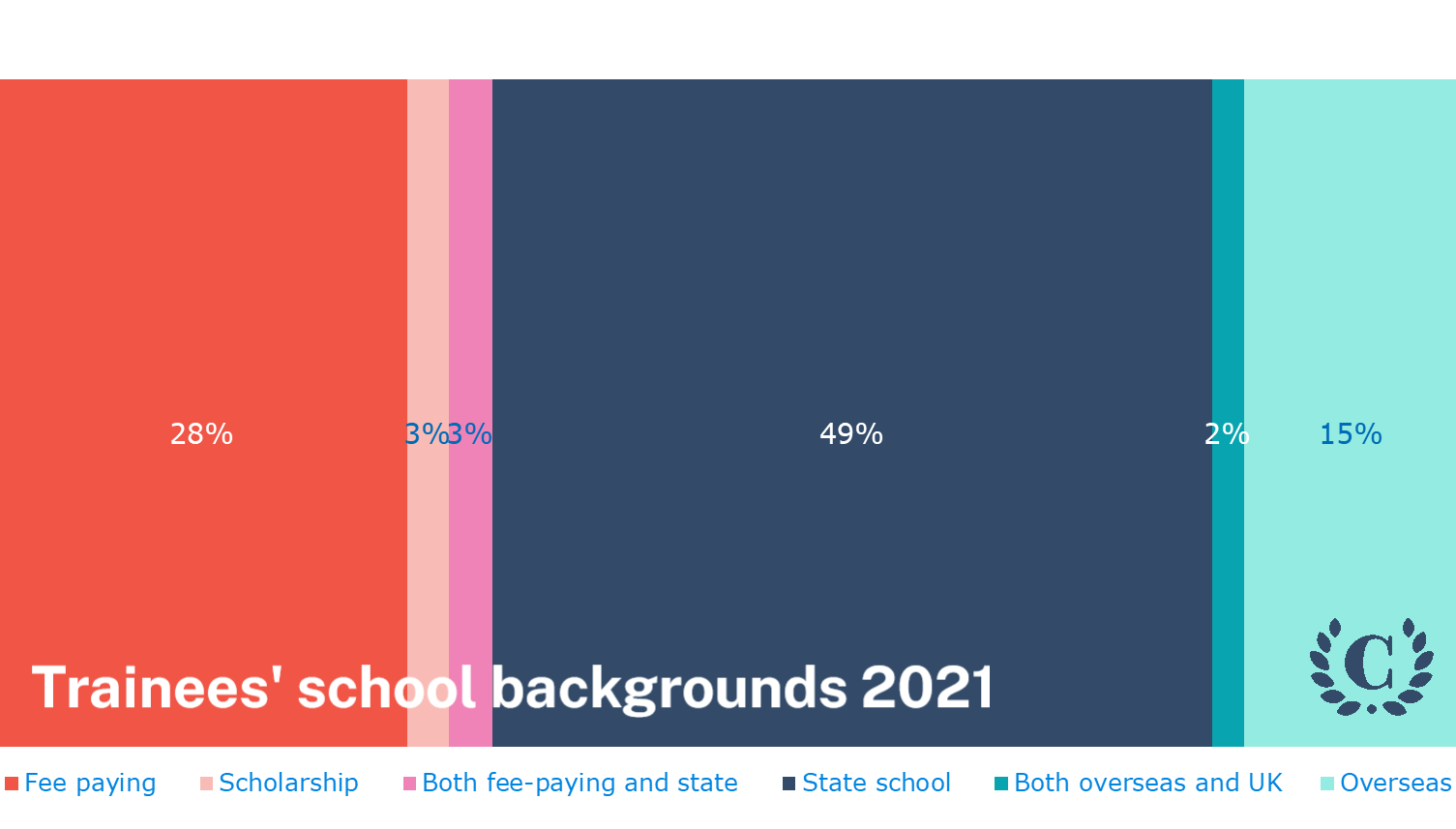
What effect does your school background have on your career in law? Our social mobility survey 2021 reveals how the leading law firms are performing.
Antony Cooke, January 2021
- Half of UK trainees at the leading firms were state educated
- The legal profession shows a strong bias towards privately-educated graduates, particularly in London
- A pay gap emerges nationwide between state-schooled graduates and privately educated
Some trainees went to a fancy school. Some did not. Why should this be the concern of law firms? Lady Hale answered this best in our interview with her: “…the law is supposed to be all about equality and fairness – those are foundational values of the law. Therefore, it is quite a good idea if the legal profession and the judiciary are visible embodiments of equality and fairness.” She added: “…we have a diverse population. The legal profession and courts are there to serve the whole population, so it ought to be the case that the whole population can recognise that these are their courts.”
Today the legal profession tells us loudly, several times a week, that diversity is a priority to them. But that hasn’t always been the case: the past decade has seen a shift in attitudes. It began with firms tentatively acknowledging ‘the business case for diversity’, then clients decided change was needed and it became core business rather than CSR. But, living in the age of #metoo and the BLM movement, we’ve seen the discussion get far more sophisticated. Firms are now fluent in terms like ‘intersectionality’ and ‘implicit bias.’ They have set targets for gender and ethnicity, and are seeing results – in some respects.
"...it is quite a good idea if the legal profession and the judiciary are visible embodiments of equality and fairness.” – Lady Hale
But anyone who has ever been inside a law firm will note that tackling gender and ethnicity is only part of the challenge – lawyers still represent a privileged economic class, so we aren’t much closer to satisfying Lady Hale’s aspirations, despite all the well-intentioned dialogue. The findings in our latest research show just how far off law firms are from solving the privilege issue.
We’ve monitored these figures for five years, and for the fifth year in a row, law firms are showing a strong bias towards privately-educated graduates. As you’ll see from the graph below, all but the national firms are hiring more privately-educated grads than the proportion the Russell Group supplies into the market. Oxford and Cambridge, who sit at one extreme of the Russell Group scale, enrol around 40% private-schooled students most years, but most of the London legal market is recruiting privately-educated graduates in numbers above what even Oxbridge is able to release into the employment market.
How does the legal profession compare to the general public? State-schooled trainee numbers v. fee-paying.

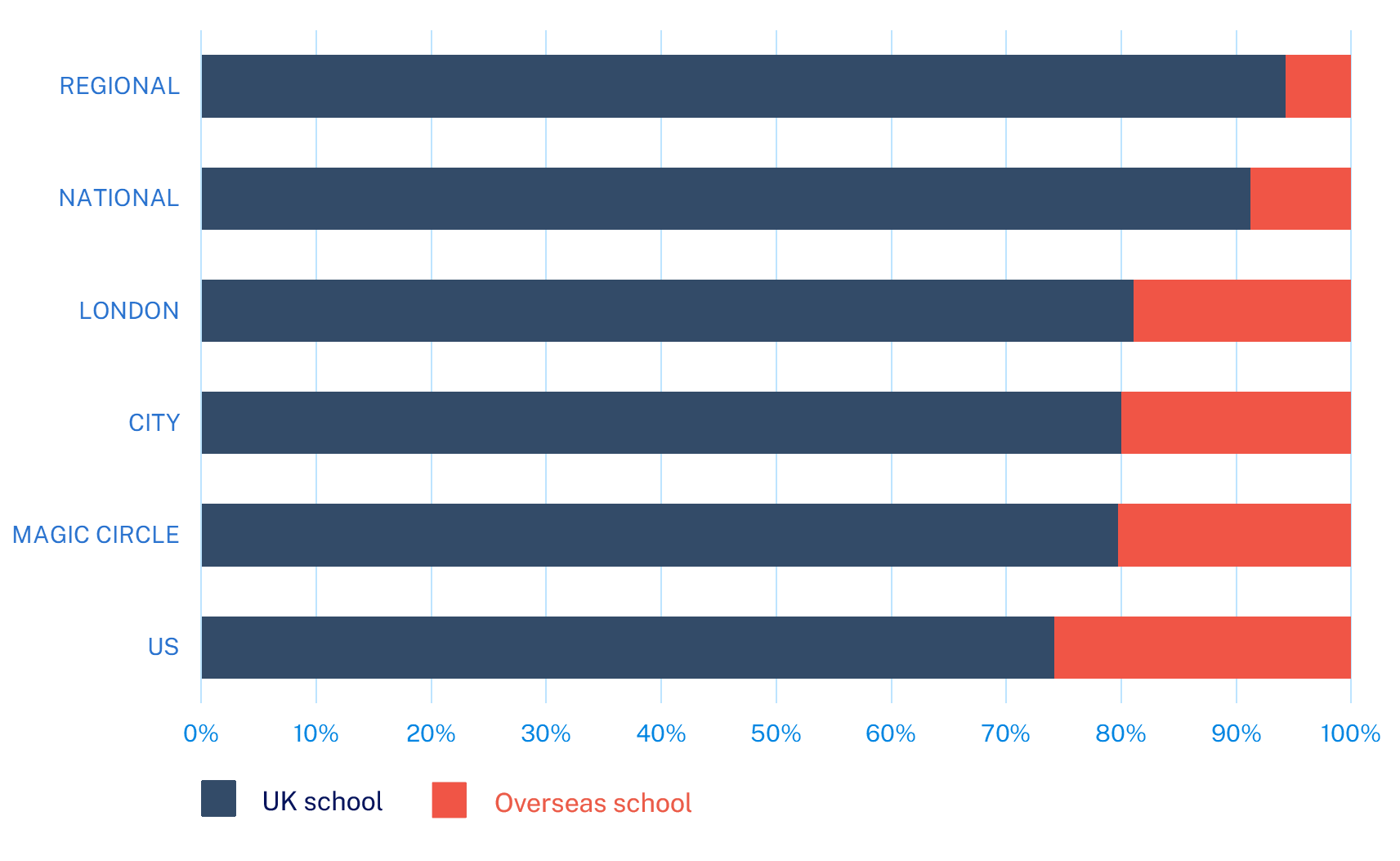
Our research also found that graduates educated overseas are big part of the picture in the London legal recruitment market. Global firms seek out worldly students; for this reason we found overseas-educated students to be the highest paid in the London market.
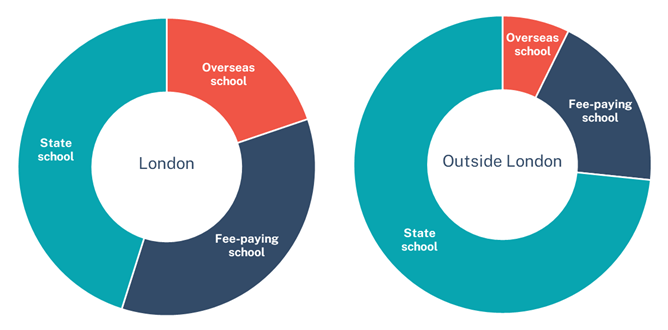
We also found practice areas attract different types of people.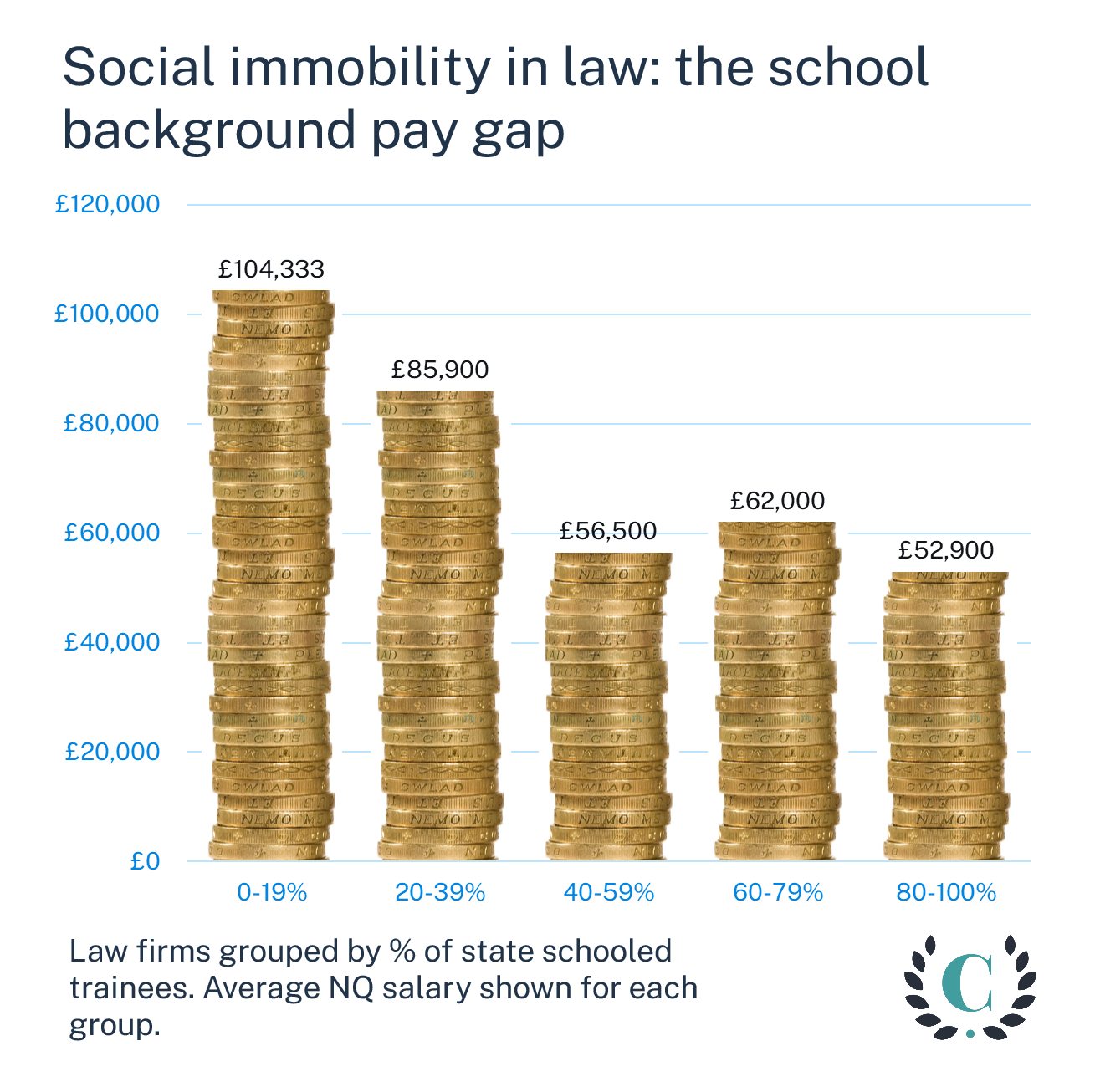
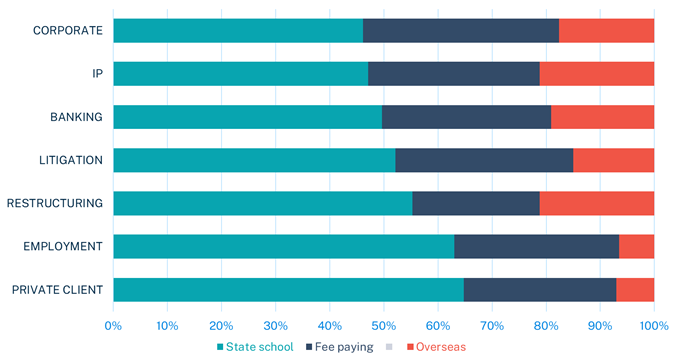
Beyond Lady Hale’s concern about representation of the general public and the quality of legal decisions, we find a second problem in the individual’s access to the profession and the wealth that accompanies it. Below we grouped law firms by the number of state-schooled trainees they hired and gave the average NQ pay for each group.
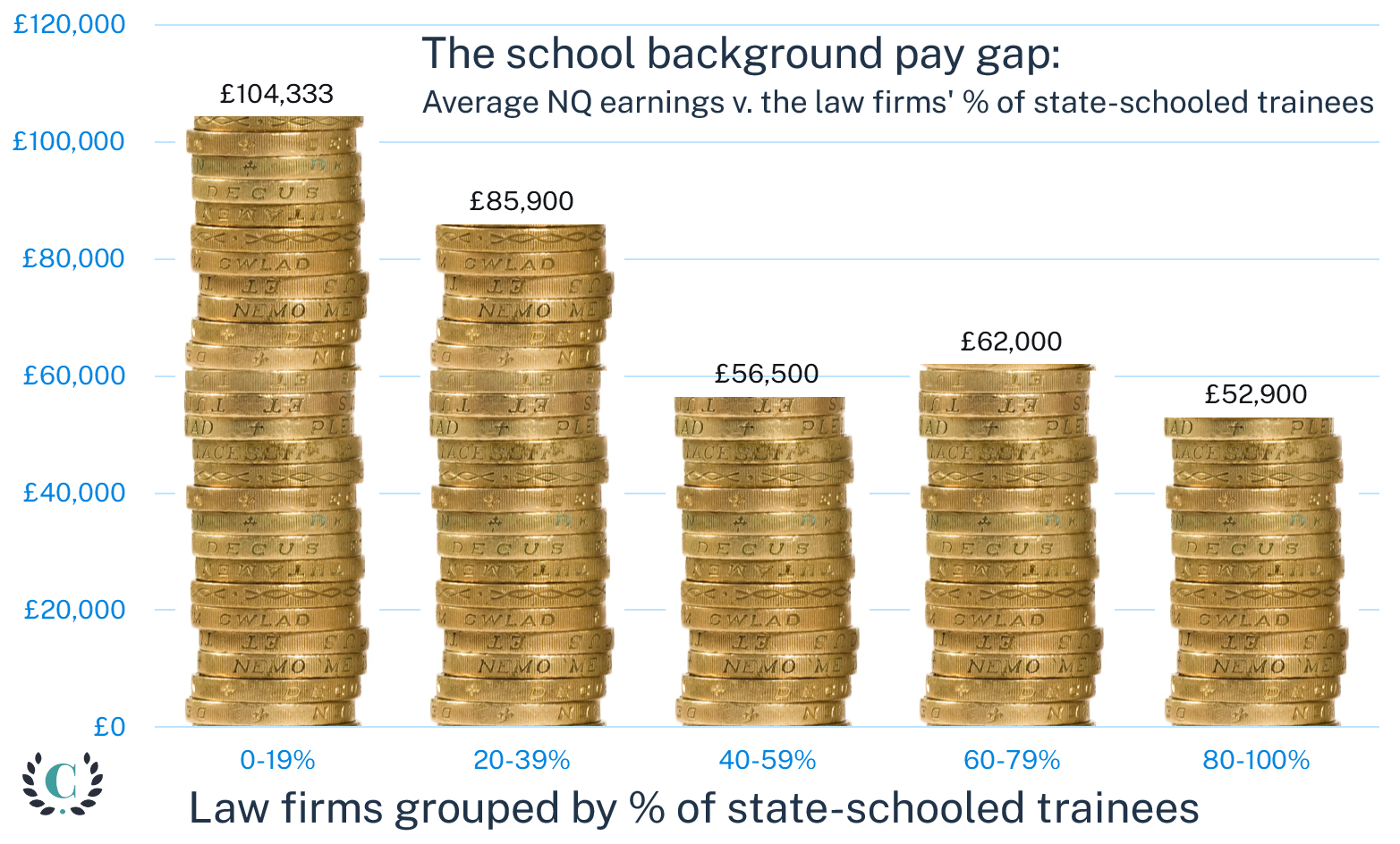
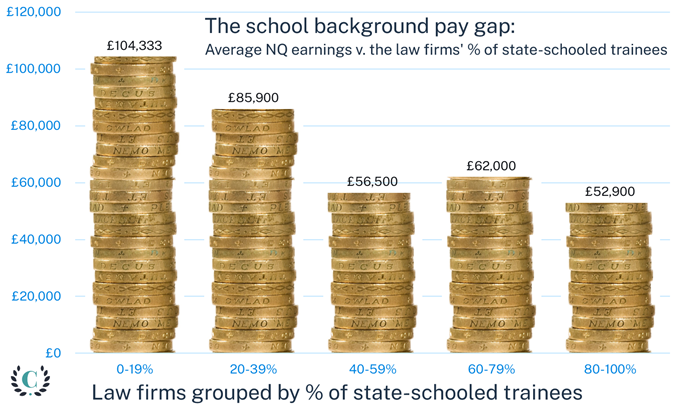
These findings show that elite earnings are far more accessible to those who went to elite schools. The bias to privately-educated students is starkest in the highest-paying firms. This plays out, albeit in a less pronounced way, in trainees’ long-term ambitions or loyalty to their firms.
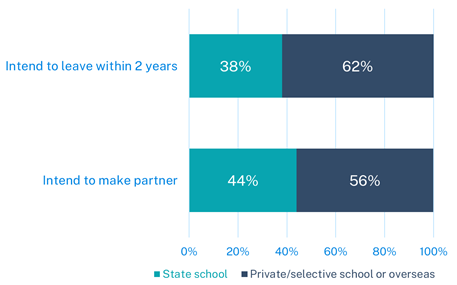
Where does a law firm's duty begin and end?
You could argue that solving society’s ills is beyond the duties of a commercial law firm. They operate in a free-market economy and their hiring choices meet commercial demands. In the law, one measure of success is how much business the lawyers can win and retain. Clients – themselves at the top of their profession and not unlikely to be posh – instruct firms based on all manner of factual and economic factors, but the firm that wins is the one the client trusts the most. Building trust isn’t the kind of skill you can study for; it is earned and based on a relationship, and this is where unconscious bias comes in.
'To get anywhere near a training contract, things need to have gone pretty well in your life.'
When partners interview graduates, they’re looking for people they can put in front of the client and safeguard all their relationships. Candidates with similar life experiences and references grow a more natural bond in interview. Those with a certain confidence and polish tend to do best – the firm can already imagine them networking with the client.
Here we should credit legal recruitment teams who are aware of the scale of this issue and are addressing it with purpose. They are signing up to schemes such as Rare Recruitment in order to resolve it. Rare's Contextual Recruitment System (CRS) is seeing increasing use. This software allows recruiters to view graduates' grades in the context of their educational background using factors such as whether the student received free school meals, whether they are the first in their family to go to university and the deprivation index of their school postcode.
Improving the gender and ethnicity balance in law firms is not easy, but improving social mobility is more difficult still. To get anywhere near a training contract, things need to have gone pretty well in your life. Strong academics and a confident, presentable manner rarely happen by accident, but through a stable education and a support network. Private schools are designed to prepare pupils for the professional world and law firms can't ignore the quality of candidates they produce. But top universities are already filtering the high achievers in a way that favours private education; that law firms see those top graduates and push the bias even further towards privileged students is a problem for this industry. But that part is the easier problem to solve.
Our methodology
In years past, our research on this topic involved asking law firms to give their demographics figures. Firms only shared the data they were happy to see it go public, so naturally, some of the dodgier figures went unreported. We felt our readers deserved better, so we turned to the trainees instead and asked 2,655 of them what school they went to. We then compared each data point with other metrics – salaries, ambition, practice area – and put forward correlations where they occurred.
Across our research we group law firms by type because each group behaves in their own special way. They appeal to different types of graduates and different clients, and they often face very different challenges. Our standard groupings for law firms are:
- London non-City (non-financial, non-corporate, more focused on litigation, private client, small businesses, niche sectors, and human rights)
- Magic circle (the five elite financial and corporate firms headquartered in London)
- US firms (a firm originated in the US or created through a transatlantic merger retaining a strong US identity, usually competing with the City firms and magic circle)
- City firms (financial and corporate firms that are not part of the magic circle and not US firms, typically London headquartered, the silver circle are included here)
- National firms (has a strong nationwide presence as well as a significant presence in London, and features in the Chambers UK nationwide rankings)
- Regional firms (a minority or no London presence, best known for serving a regional client base, features in the Chambers UK regional rankings)
We partnered with Rare and their campus ambassadors to learn more about the state of social mobility in the legal profession and how to improve it. Learn more>>